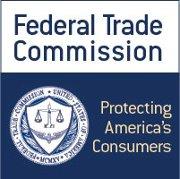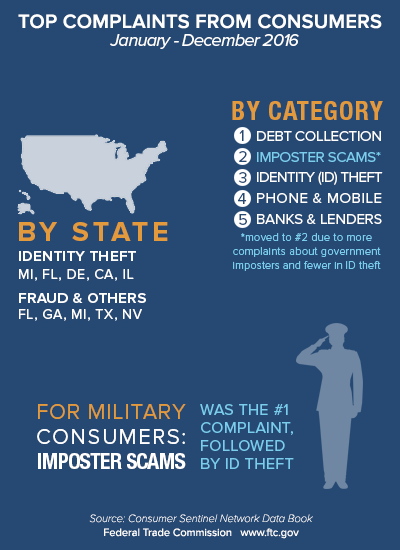
FTC Releases Annual Summary of Consumer Complaints
Imposter scams are now the second most common source of consumer complaints
 Imposter scam complaints surpassed identity theft for the first time as
the second most common category of consumer complaints received by the
Federal Trade Commission’s Consumer Sentinel Network in 2016, according to the
agency’s new Data Book.
Imposter scam complaints surpassed identity theft for the first time as
the second most common category of consumer complaints received by the
Federal Trade Commission’s Consumer Sentinel Network in 2016, according to the
agency’s new Data Book.
Although debt collection complaints declined slightly between 2015 and 2016, they remained the top consumer complaint category, comprising 28 percent of all complaints. The high number of reported debt collection complaints was due in part to complaints submitted by a data contributor who collects complaints via a mobile app.
The rise in impostor scam reports is due to an increase in complaints about government imposters. Imposter scams come in many varieties, but work the same way: a scammer pretends to be someone trustworthy, such as a government official or computer technician to convince a consumer to send money. Imposter scams also topped the list of complaints from military consumers followed by identity theft complaints.
Identity theft complaints declined from 16 percent in 2015 to 13 percent in 2016, with 29 percent of 2016 consumers reporting that their data was used to commit tax fraud. There was a jump in those consumers who reported that their stolen data was used for credit card fraud; this figure rose from nearly 16 percent in 2015 to more than 32 percent in 2016.
“Our latest data book shows that imposter scams are a serious and growing problem, and you can be sure that the FTC will use all the tools at its disposal to address it,” said Thomas Pahl, acting director of the FTC’s Bureau of Consumer Protection. “That includes law enforcement actions against scammers and consumer education to help consumers avoid losing money.”
The most widely reported method of payment (58 percent) for those who reported losing money to fraud was a wire transfer. Of those who noted in their fraud complaint how they were first contacted, 77 percent said it was by phone.
The FTC urges consumers to be wary of any caller asking for a wire transfer. The government will not ask a consumer to wire money, and it is illegal for telemarketers to ask you to pay by wire. Consumers who get a suspicious call should take their time and check it out. Call the government agency on a phone line you know to be real -- not the phone number given by the suspicious caller.
In 2016, the Consumer Sentinel Network collected more than 3.1 million consumer complaints, which the FTC has sorted into 30 top complaint categories. As with 2015, Florida, Georgia and Michigan were the top three states for fraud and other complaints, while Michigan, Florida and Delaware were the top three states for identity theft complaints.
The complaint categories making up the top 10 are:
|
Number of complaints |
Percentages |
|
|
Debt Collection |
859,090 |
28 |
|
Impostor Scams |
406,578 |
13 |
|
Identity Theft |
399,225 |
13 |
|
Telephone and Mobile Services |
292,155 |
10 |
|
Banks and Lenders |
143,987 |
5 |
|
Prizes, Sweepstakes and Lotteries |
141,643 |
5 |
|
Shop-at-Home and Catalog Sales |
109,831 |
4 |
|
Auto-Related Complaints |
94,673 |
3 |
|
Credit Bureaus, Information Furnishers and Report Users |
49,679 |
2 |
|
Television and Electronic Media |
49,546 |
2 |
The FTC produces the Consumer Sentinel Network Data Book annually using complaints received by the Consumer Sentinel Network. These include complaints made directly by consumers to the FTC, as well as complaints received by state and federal law enforcement agencies, national consumer protection organizations, and non-governmental organizations.
The Data Book includes national statistics, as well as a state-by-state listing of top complaint categories in each state and a listing of metropolitan areas that generated the most complaints per capita.
The Consumer Sentinel Network’s secure online database is currently available to more than 2,300 individual users in civil and criminal law enforcement agencies across the country and abroad. Agencies use the data to research cases, identify victims and track possible targets. Although non-governmental organizations may contribute data to the database, only law enforcement agencies can access the database.
The Federal Trade Commission works to promote competition and protect and educate consumers. You can learn more about consumer topics and file a consumer complaint online or by calling 1-877-FTC-HELP (382-4357).
